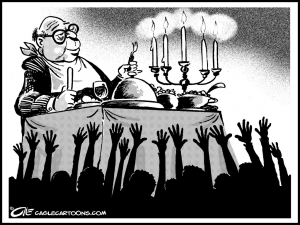Another platinum coin surge in the Second Wave rippled through the mainstream media yesterday and this time hit the Congressional Progressive Caucus. Domenico Mantanaro of MSNBC kicked things off on one of the morning shows by mentioning the Trillion Dollar Coin (TDC) as a possible solution to the debt ceiling problem. Then, in the afternoon, on MSNBC’s the cycle, Krystal Ball, and Steve Kornacke, in discussing the coming debt ceiling conflict talked rather matter-of-factly, I thought, about minting some TDCs to get around the debt ceiling. Continue reading
Bank Whistleblowers United
Posts Related to BWU
Recommended Reading
Subscribe
Articles Written By
Categories
Archives
Blogroll
- 3Spoken
- Angry Bear
- Bill Mitchell – billy blog
- Corrente
- Counterpunch: Tells the Facts, Names the Names
- Credit Writedowns
- Dollar Monopoly
- Econbrowser
- Economix
- Felix Salmon
- heteconomist.com
- interfluidity
- It's the People's Money
- Michael Hudson
- Mike Norman Economics
- Mish's Global Economic Trend Analysis
- MMT Bulgaria
- MMT In Canada
- Modern Money Mechanics
- Naked Capitalism
- Nouriel Roubini's Global EconoMonitor
- Paul Kedrosky's Infectious Greed
- Paul Krugman
- rete mmt
- The Big Picture
- The Center of the Universe
- The Future of Finance
- Un Cafelito a las Once
- Winterspeak
Resources
Useful Links
- Bureau of Economic Analysis
- Center on Budget and Policy Priorities
- Central Bank Research Hub, BIS
- Economic Indicators Calendar
- FedViews
- Financial Market Indices
- Fiscal Sustainability Teach-In
- FRASER
- How Economic Inequality Harms Societies
- International Post Keynesian Conference
- Izabella Kaminska @ FT Alphaville
- NBER Information on Recessions and Recoveries
- NBER: Economic Indicators and Releases
- Recovery.gov
- The Centre of Full Employment and Equity
- The Congressional Budget Office
- The Global Macro Edge
- USA Spending
-




 Rational public debate about the economy and government’s role in the economy is currently in extremely short supply. In a
Rational public debate about the economy and government’s role in the economy is currently in extremely short supply. In a 







